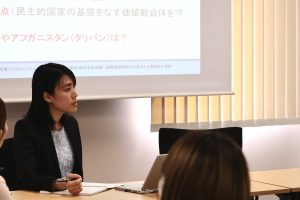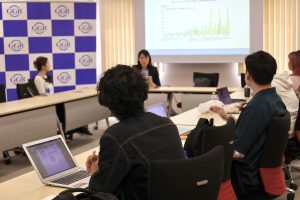On April 19, 2023, the Institute for Global Governance Research (GGR) hosted its 14th GGR Brown Bag Lunch Seminar on “What Is ESG Investment?: The Intersection of Global Issues and Businesses” with Dr. Yuki Miyoda, Junior Fellow at the Graduate School of Law, Hitotsubashi University.
During the early part of the seminar, Dr. Miyoda explained the background behind the rise of ESG (Environment, Social, and Corporate Governance) investments. She pointed out two main reasons for the emergence of ESG investments. First, global issues such as climate change and human rights risks have become apparent. Second, there is a growing recognition among companies and investors that they should consider not only the impact of the environment and society on businesses but also the impact of businesses on the environment and society. This two-sided approach is known as “double materiality.” The concept of ESG investments has gained momentum since the United Nations established the Principles for Responsible Investment (PRI) in 2006. It has spread to the global financial industry and private companies, aiming to incorporate environmental, social, and governance perspectives into investment decision-making processes. Dr. Miyoda then explained the essence of ESG investments based on two points. Firstly, companies’ efforts to address ESG issues have been quantified, data-driven, and made publicly available, enabling comparisons of their approaches to ESG issues. Secondly, institutional investors such as investment trusts, insurance companies, and pension funds, which engage in long-term investments, have started utilizing the aforementioned corporate data to consider climate change, human rights risks, and other factors that can affect returns (or be turned into revenue opportunities). Thus, while ESG investments, driven by the private sector, are expanding to address global issues, Dr. Miyoda pointed out various criticisms surrounding ESG investments. These criticisms include greenwashing (superficial commitment to ESG) and the lack of clear criteria and fluctuations in determining what constitutes ESG issues.
During the Q&A session attended by 15 students and faculty members from Hitotsubashi University, numerous questions were raised regarding the current state and challenges of ESG investments, as well as future prospects. In response to a question about which country or region contributes the most to ESG investments, Dr. Miyoda explained that while the European Union has been taking the lead in promoting initiatives, there is a growing emphasis on “social impact” among investors. As a result, there is a trend of investing in the “Global South” in pursuit of both social and economic returns. Furthermore, when asked about the ambiguity of evaluation criteria for ESG investments, she highlighted that assessment directions are influenced by Western standards, and there is a movement to establish localized evaluation criteria by countries and regions.
【Event Report prepared by】
Tomohito Nakano (Master’s student, School of International and Public Policy, Hitotsubashi University)


